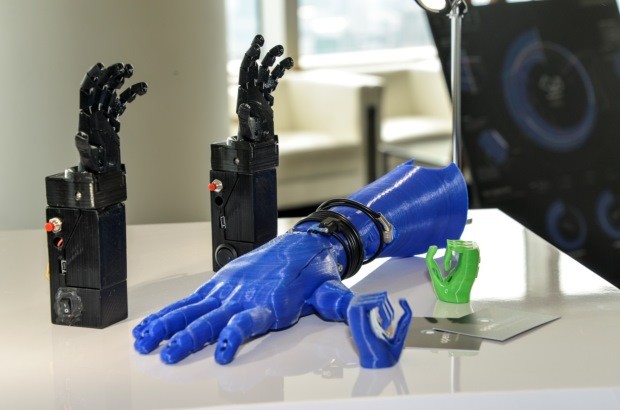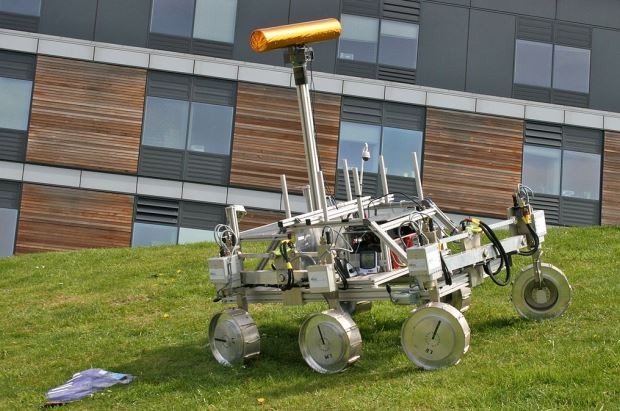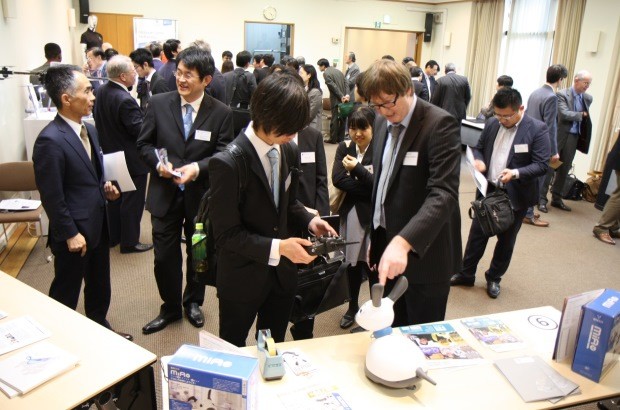
What if a disabled child could gain access to cheap prosthetics that were tailored to their specific needs or workers could investigate a radioactive area without exposing themselves to dangerous levels of radiation?
These are just a few fascinating areas of research the UK is pioneering within the field of Robotics and Autonomous Systems (RAS). During its Innovation is GREAT launch week, the Science and Innovation Network (SIN) Japan ran a robotics week to encourage greater collaboration between the UK and Japan in this rapidly growing industry.
When you first hear the word ‘robot’ there is a good chance it will conjure up images of the lovable R2-D2 in Star Wars or the terrifying androids in Terminator. Robots have an iconic status in our science-fiction, but rapid technological advances are making their domestic, commercial and military applications a reality. They can now take the place of humans in dangerous environments (for example, defusing bombs and exploring nuclear sites), and are also used in manufacturing processes. They have even begun to resemble us in appearance, behaviour and cognition.
These technologies have the potential to revolutionise the UK economy and society over the coming decades. An important area currently being looked at by both the UK and Japan is providing assistive healthcare to an ageing population; RAS can enhance an elderly person’s quality of life and give them greater independence in their homes.
As a result, Robotics and Autonomous Systems have been identified as a key growth area for the UK in the Eight Great Technologies. The UK has strong capabilities in the software side of robotics, particularly in areas of cognition, autonomy and human-robot interaction. For example, the European Space Agency’s ExoMars rover, due to land on Mars in 2018, mainly uses British autonomous technology for navigation. This helps it travel further during the Martian day and therefore carry out more investigations.

The UK is in a prime position to become a world leader in RAS technologies, with its global economic impact by 2050 estimated at $1.9 to $6.4 trillion per year. The government is committed to creating a thriving robotics industry, and in 2014 announced a £400m innovation drive in the UK’s RAS strategy.“The UK could achieve 10% of the global market share by 2025," says David Lane, Chair of the UK RAS Special Interest Group.
Robotics was at the forefront of the launch of the year-long Innovation is GREAT campaign by by the Duke of Cambridge in February 2015. This campaign led by the British Government will build partnerships between the United Kingdom and Japan, through business, education and academia, and bring the benefits of science to society. Already over 8,000 researchers are exchanged between Japan and the UK each year.
To encourage these partnerships, the British Embassy Tokyo hosted a robotics week during the campaign launch. The SIN and UKTI teams have a privileged access to a number of key stakeholders. This allows UK delegates to network with key decision-making individuals and entities that are responsible for setting the RAS roadmap in Japan.
Top robotics experts from the UK and Japan were invited to discuss current activities and look at opportunities for collaborations. UK delegates also met officials from Japan’s Ministry of Economy, Trade and Industry to discuss the UK and Japan’s robotic strategy, and visited leading technology institutes such as AIST and Hitachi, as well as innovative spin-off companies such as Cyberdyne, which produces HAL (Hybrid Assistive Limb) robotic suits for the physically challenged. Workshops and panel discussions at the Embassy fostered a dialogue for future collaborations. The week ended with the launch event for the Innovation is GREAT campaign at Roppongi, which was opened by the Duke of Cambridge.

One of the sessions was a technology showcase, a Robot-Go-Round event where Japanese delegates took it in turns to meet each of the UK delegates and see their products. Below are some exciting examples of the UK companies present at the event.
CREATEC is a Cumbria-based company that has developed a camera technology called N-Visage for robots that can detect and draw a 3D map of high radiation locations that are too contaminated for human workers. It is undertaking one of eleven feasibility studies subsidised by the Japanese government to investigate radiation imaging as a tool for locating fuel debris in the Fukushima reactor cores. Using an automated drone, they are capable of investigating the site without putting humans at risk of radiation exposure.
https://www.youtube.com/watch?v=CHaf8QhI7D8
MIRO is a biomimetic robot created by the University of Sheffield that copies the behaviour of animals. It can learn from its interactions and can become loyal to its owner and respond to their voice.
IMITEC is a recently established spin-out company of the University of Bristol. It produces a drone with powerful sensors that can produce a high resolution map of radiation sources and contamination.
Reach Robotics is a UK-based start-up company that is developing the world’s first robot gaming system called Mecha Monsters. These are custom mechanical battle gaming robots that respond to their user’s command via a smartphone app.
https://www.youtube.com/watch?v=D7uHQMB6WE0
Open Bionics is an open-source initiative for the development of affordable, light-weight, modular robotic hands and prosthetic devices that can be easily reproduced using off-the-shelf materials.
Touch Bionics - University of Edinburgh is a provider of world-leading prosthetic technologies and supporting services designed to ensure the best possible outcomes for people with upper limb deficiencies.
https://www.youtube.com/watch?v=dIMJ6iKSm_s
The UK and Japan will have a lot of shared challenges in the future, such as an ageing population and nuclear decommissioning. This breeds a potential for many dynamic collaborations in RAS technologies which we have only just seen a taste of so far. SIN Japan and UKTI will be supporting these exciting projects and if you are interested in getting involved please contact us. Click here if you would like to find out more about the work of SIN Japan. Keep up to date on the latest business opportunities in Japan and connect with us directly to understand your potential in the Japanese market.
Emanuele Militello
Science and Innovation Team, British Embassy Tokyo
